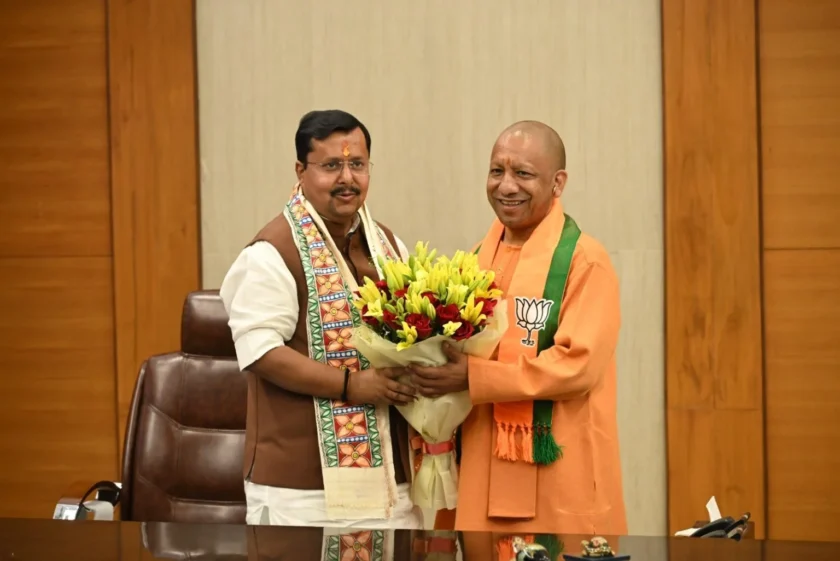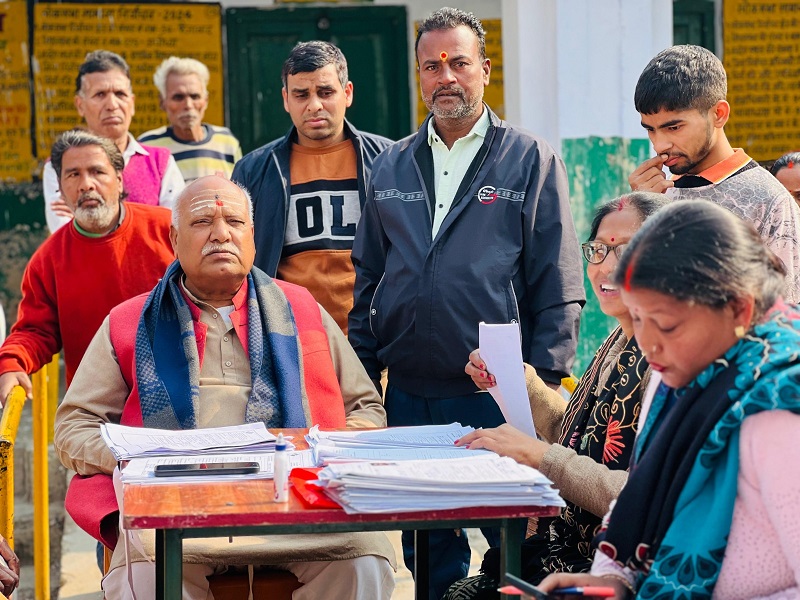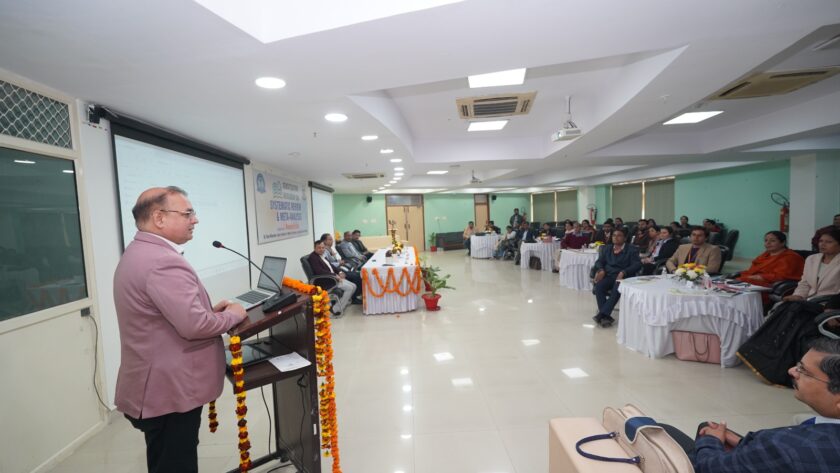Bareilly: Research scholar Rashtra Vardhan, who is currently a Senior Research Fellow (SRF) in the Law Department at MJP Rohilkhand University, has completed his 5-year research work under the guidance of Dr. Amit Singh, Head of the Department and Dean of the Faculty of Law. The title of the PhD research is “Secured Cyberspace: An analysis of the right to internet access and its implications for cyber security”.
The aforementioned research provides a detailed analysis of various legal dimensions of internet use,internet shutdowns, and cyber security in India.

How integral the internet has become to all our lives was experienced by the residents of Bareilly during the last 72 hours when the District Administration, Bareilly, imposed an internet shutdown from 27/09/25 to 30/09/25 midnight to prevent the deterioration of law and order, stop riots, and maintain public peace. During this period, all internet services were shut down in Bareilly district. The internet has become the medium for our daily needs, online transactions, shopping, business activities, health services, banking, education, judicial work, the functioning of other important institutions, and the exercise of all our rights.
The extent of Indians’ reliance on the internet can be estimated from the fact that, according to a Bloomberg report, India had 886 million active internet users in 2024, a number which has crossed 900 million by 2025. This is in line with the current Indian government and Prime Minister Shri Narendra Modi’s Digital India goals.
However, conversely, an internet shutdown imposes restrictions on citizens’ important rights. Shutting down internet services in a nation, state, territory, or any part thereof is called an internet shutdown.
Recently,during the Gen Z movement by students in Nepal, an internet shutdown was imposed by blocking 26 social media sites, which led to widespread protest demonstrations. Through an internet shutdown, the administration can either partially or completely disrupt/stop internet services. The negative impact of internet shutdowns can be gauged from the fact that in 2023, India suffered a loss of approximately $585 million due to internet shutdowns, and in 2024, a loss of approximately $329 million.
In Jammu& Kashmir, a state of India, an internet shutdown was imposed for over 3 years because the law and order situation there remained poor due to cross-border terrorism.
Since an internet shutdown directly affects our daily business activities such as online shopping, digital payments (UPI), online education, the health system ,Ayushman scheme, health insurance approval, etc., the banking system, and other such institutions operating in digital mode, the following questions arise:
When and under what circumstances should an internet shutdown be imposed by the administration?
What are the legal provisions concerning internet shutdowns?
What are the grounds for imposing an internet shutdown?
Answers to all these questions are provided in this research work.
The legal provisions/rules concerning internet shutdowns are given under Section 5(2)of the Indian Telegraph Act, 1885, and Rule 2(1) of the Temporary Suspension of Telecom Services (Public Emergency or Public Safety) Rules, 2017. Under these, the administration can take action for an internet shutdown on the grounds of public emergency or public safety. The power to issue and implement such orders lies with:

* The Union Home Secretary (for shutdowns at the national level) and the State Home Secretary (for shutdowns at the state level).
* In unavoidable circumstances, an officer of the level of Joint Secretary (duly authorized) can issue the order, but it must be confirmed within 24 hours, otherwise the order will cease to exist.
* Under Section 163 of the BNSS, 2023, a District Magistrate or Sub-Divisional Magistrate can also issue an order to disrupt internet services in an area with the objective of establishing peace.
Along with this, Sections 66A, 69A, and 79 of the Information Technology Act, 2000, provide powers to arrest a person for sending offensive messages, block any inappropriate online content, and establish appropriate guidelines or standards in this regard, respectively.
This research work also includes a study of the legal provisions concerning internet shutdowns in other nations such as the USA, Canada, the European Union, the United Kingdom, etc. According to this study:
In countries like the USA, Canada, Europe, etc., internet shutdown is used as a measure of last resort because the economic systems of all these countries are internet-based.
* As far as possible, internet shutdowns are imposed for a short duration and only in the area affected by the disturbance.
* Any orders for internet shutdown are subject to judicial review, meaning the court can examine whether the internet shutdown was imposed arbitrarily.
In India, the administration issues orders for internet shutdown only in emergency situations (to maintain public safety and public peace), but sometimes, the government or administration is accused of these orders being arbitrary.
For instance,first, in the case of Fahima Shirin vs. State of Kerala (2019), the appellant, a student living in a hostel, was issued an order depriving her of internet use at night. The Hon’ble High Court deemed this order wrong and decided that no citizen can be deprived of internet access, as it is their fundamental right.
Similarly,there are other examples where the government imposed internet shutdowns for a very long period, such as:
* In 2019, after the amendment to Article 370, the internet was shut down in Jammu & Kashmir for a very long time. This was stopped by the Hon’ble Court in the Anuradha Bhasin (2020) and Media Professionals cases (2023), and internet facilities were restored.
* Governments in several states have even used internet shutdowns to prevent exam paper leaks.
* Similarly, currently in Manipur, due to violent clashes between the Kuki and Meitei communities, an internet shutdown has been in place for over 100 days.
Now the question arises:
* Is imposing an internet shutdown a violation of citizens’ fundamental rights or a tool for the government to maintain peace and order?
Since internet access is like walking on a double-edged sword, this is because while the internet is immensely useful, it is equally misused.
Whenever there is violence,rioting, or rebellion in an area, or an apprehension of the same, then rumours, misinformation, and objectionable material can be spread on social media (Facebook, Instagram, YouTube, WhatsApp, and Twitter) via the internet to incite people. Therefore, the administration uses internet shutdowns, as may be done currently in the Bareilly area, and anticipating this danger, the administration has stopped the internet.
But we must not ignore the other aspect of this danger because now almost all major institutions operate in digital mode,especially digital payments, health services, online banking, online education, etc., which are quite negatively impacted.
Therefore, regarding internet shutdowns, the following suggestions have been presented in this research work after 5 years of research:
* Internet shutdown should be used as a measure of last resort so that citizens face minimal inconvenience.
* A separate and clear legal procedure should be specified in this regard to ensure transparency, accountability, and fairness.
* Orders for internet shutdown should be communicated to citizens through public information, and such orders should be subject to judicial review.
* Adhering to the principle of proportionality, a balance should be maintained between citizens’ fundamental rights and state security when using internet shutdowns.
* Internet shutdown should be implemented in such a way that only apps impacting state security are restricted, and citizens’ basic needs like health, education, and business activities are not negatively affected.
* Internet shutdown should not be imposed for a long-term duration and should be periodically evaluated by an impartial committee.









